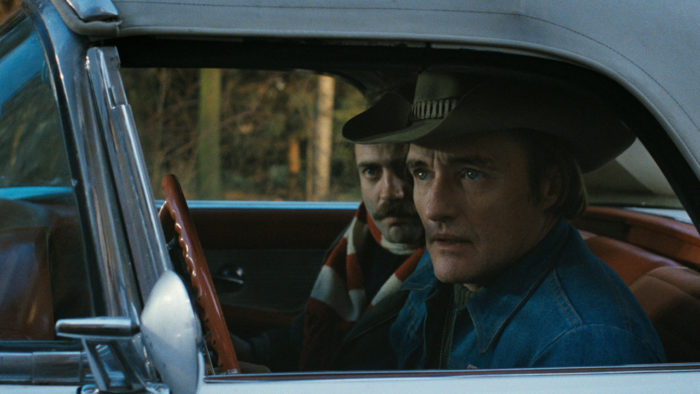VOD film review: The American Friend
Review Overview
Cast
8Plot
6Style
7David Farnor | On 27, Feb 2019
Director: Wim Wenders
Cast: Dennis Hopper, Bruno Ganz, Lisa Kreuzer, Gérard Blain
Certificate: 12
When is a Tom Ripley movie not a Tom Ripley movie? When there’s almost no Tom Ripley in it. The American Friend may be named after him, but he only appears occasionally in Wim Wenders’ film, which is based on Ripley’s Game, the third in Patricia Highsmith’s series of novels. Like the book, it casts Ripley as an elusive figure, who sets murder in motion as a form of revenge, and then coolly watches the moral and psychological fallout. When he does turn up, though, he’s not the Tom we know.
Here, he’s played by Dennis Hopper, who gives us a Ripley unlike any other we’ve met. Alain Delon, Matt Damon and John Malkovich have all taken on the role over the years, but none of them wore a cowboy hat or sauntered through scenes with a louche, psychotic quality that occasionally feels more Hopper than Highsmith. But such an alien, alienating take on the antihero doubles down on Ripley’s fish-out-of-water outsider status, and gives him an intriguingly unknowable quality than, say, Damon’s more vulnerable fraudster – this American Friend, who places the emphasis firmly on American, feels more intimidating than any of the others to take to the screen.
Perhaps most importantly, though, Hopper’s Ripley provides a striking contrast to the Hamburg world in which the conman now lives – and highlights the subtle work by the cast bringing that world to life. Specifically, the late, great Bruno Ganz, who plays Jonathan Zimmerman. Zimmerman is a framer with leukaemia, who works in the Hamburg art industry. He crosses paths with Ripley at an auction, where Tom’s legally dubious reputation precedes him, and he snubs him due to the rumours about his fraudulent schemes. That act, though, nudges Ripley’s vengeful streak into gear, and he volunteers Zimmerman to a criminal friend as the supposed ideal man to carry out a killing – and, at the same time, preys upon Zimmerman’s fear of terminal illness to manipulate him into actually doing it.
Granz, who will forever be remembered for his turn as Hitler in Downfall, is remarkable, delivering a subtle, understated performance that’s right at the heart of what makes The American Friend work. Wim Wenders adapts the novel for the screen with more of a nose for atmosphere than plot, and he draws us into his neo-noir underworld with the kind of evocative style and colour you’d expect from the New German Cinema filmmaker.
That sense of mood proves more compelling than the script’s plot twists or surprising climax (different to the books), and it brings shades of nuance to the growing bond that forms between Ripley and his target in their brief moments together. It’s Ganz who’s the real star, though, and his unassuming framer takes the centre stage to earn our sympathy – we watch as he comes to believe that he should do whatever it takes to leave money for his wife and young son, just in case he dies sooner than expected. Throughout, Ganz moves between German and English, depending on which other characters Zimmerman’s talking to – a nice touch that underscores the splitting halves of his life and identity over two patient hours. The result might not be a Tom Ripley movie in the traditional sense, but it is a Bruno Ganz movie, and that’s certainly nothing to complain about.




















